
The Pakistan Muslim League (N) abbreviated as PML (N), (Urdu: پاکستان مسلم لیگ (ن)) is a centre-right, conservative liberal political party in Pakistan. It is currently the third-largest party in the Senate and the largest in the National Assembly. The party was founded in 1993, when a number of prominent conservative politicians in the country joined hands after the dissolution of Islamic Democratic Alliance, under the leadership of former Prime Minister Nawaz Sharif. The party's platform is generally conservative, which involves supporting free markets, deregulation, lower taxes and private ownership. Although the party historically supported social conservatism, in recent years, the party's political ideology and platform has become more liberal on social and cultural issues; however, members have been accused of using Islamist populist rhetoric. Alongside the Pakistan Tehreek-e-Insaf (PTI) and Pakistan People's Party (PPP), it is one of the three major political parties of the country.
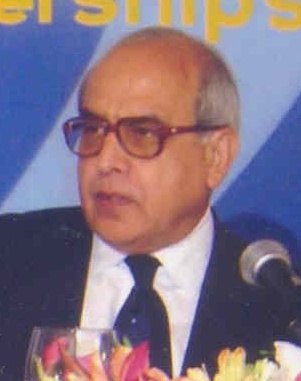
Farooq Ahmad Khan Leghari was a Pakistani politician who served as the eighth president of Pakistan from 14 November 1993 until resigning on 2 December 1997. He was the first Baloch to be elected as President.

The Parliament of Pakistan is the supreme legislative body of the Islamic Republic of Pakistan. It is a bicameral federal legislature, composed of the President of Pakistan and two houses: the Senate and the National Assembly. The president, as head of the legislature, has the power to summon or prorogue either house of the Parliament. The president can dissolve the National Assembly, only on the Prime Minister's advice.

The Muttahida Majlis–e–Amal is a political alliance consisting of conservative, Islamist, religious, and right-wing parties of Pakistan. Naeem Siddiqui proposed such an alliance of all the religious parties back in the 1990s.

The Muttahida Qaumi Movement (MQM), previously known as Muhajir Qaumi Movement, is a secular political party in Pakistan that was founded by Altaf Hussain in 1984. Currently the party is split between two main factions. MQM-London faction is controlled by Altaf Hussain from London, while MQM-Pakistan is run by Khalid Maqbool Siddiqui based in Pakistan. Its electoral symbol was a kite.

Since its establishment in 1947, Pakistan has had a non-symmetric federal government and is a federal parliamentary democratic republic. At the national level, the people of Pakistan elect a bicameral legislature, the Parliament of Pakistan. The parliament consists of a lower house called the National Assembly, which is elected directly via first-past-the-post voting, and an upper house called the Senate, whose members are chosen by elected provincial legislators. The head of government, the Prime Minister, is elected by the majority members of the National Assembly and the head of state, the President, is elected by the Electoral College, which consists of both houses of Parliament together with the four provincial assemblies. In addition to the national parliament and the provincial assemblies, Pakistan also has more than five thousand elected local governments.

Chaudhry Parvez Elahi Warraich is a Pakistani politician who was the Chief Minister of Punjab from late 2002 to late 2007 and again from late 2022 to early 2023. He was a member of the Provincial Assembly of the Punjab from August 2018 till January 2023, when he, as chief minister, dissolved the assembly. In 2023, he left the Pakistan Muslim League (Q) and joined Pakistan Tehreek-e-Insaf (PTI) along with his son, Moonis Elahi, and 10 other former PML(Q) MPAs over political rifts with the party president and cousin, Chaudhry Shujaat Hussain. He was appointed as, and is currently serving as the president of the PTI. He also served as the president of the Punjab Division of the PML(Q).
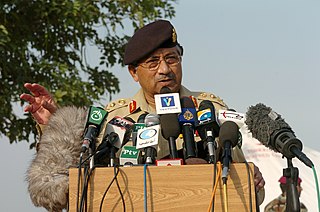
The 1999 military takeover in Pakistan was a bloodless coup d'état initiated by the military staff at the Joint Staff HQ working under the Chairman of the Joint Chiefs of Staff Committee and Chief of Army Staff General Pervez Musharraf. The instigators seized control of the civilian government of the popularly elected Prime Minister Nawaz Sharif on 12 October 1999. On 14 October, General Musharraf, acting as the country's Chief Executive, issued a controversial provisional order that suspended the Constitution of Pakistan.

Aftab Ahmad Khan Sherpao is a Pakistani politician who is the current chairman of the centre-left Pashtun nationalist Qaumi Watan Party, after previously being a member of the Pakistan Peoples Party. He was a member of the National Assembly of Pakistan from November 2002 to May 2018.
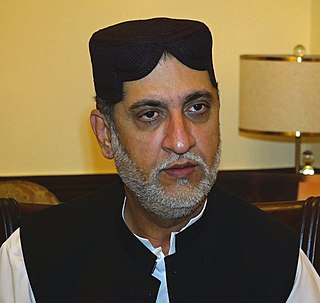
Akhtar Mengal is a Pakistani politician from Balochistan who is the chairman of Balochistan National Party (Mengal). He is also serving as a member of the National Assembly of Pakistan since February 2024. He previously served as the Chief Minister of Balochistan between 1997 and 1998 and later as a member of the Balochistan Provincial Assembly. Mengal also served as a member of National Assembly of Pakistan from August 2018 till August 2023.

Lieutenant General Fazle HaqHI(M) SBt, was a high-ranking general in the Pakistan Army, and the former martial law administrator (MLA) of Khyber-Pakhtunkhwa province of Pakistan. He was the "Corps-Commander" of the XI Corps, and commanded all the Pakistan Army assets assigned in the Khyber-Pakhtunkhwa Province. He commanded the combatant brigades, and supervised the clandestine covert network during the Soviet–Afghan War. He was one of the leading generals who led the Pakistan Combatant Forces during the Soviet–Afghan War. As military administrator, he had set up a network of training of the Afghan mujahideen. Under his command, the elements of Pakistan's administrative XI Corps participated in numerous operations against the Soviet Union.
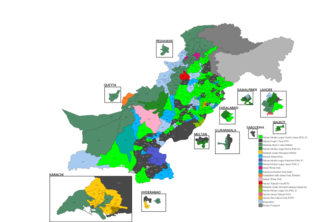
General elections were held in Pakistan on 10 October 2002 to elect the 12th National Assembly and four Provincial Assemblies. The elections were held under the military government of Pervez Musharraf. The two mainstream parties, Pakistan Peoples Party (PPP) and Pakistan Muslim League (N) (PML-N) had several restrictions imposed on them and their leaders Benazir Bhutto and Nawaz Sharif were in exile. In order to address the restrictions, PPP created the Pakistan Peoples Party Parliamentarians (PPPP) under the leadership of Ameen Faheem, to contest the elections on its behalf. The PML-N meanwhile, suffering from the party's division into two factions: one that remained loyal to Sharif and were contesting the elections under the leadership of Javed Hashmi, and the other which had broken away to form the pro-Musharraf Pakistan Muslim League (Q) (PML-Q) under the leadership of Mian Muhammad Azhar. The emergence of the PML-Q marked the beginning of multi-party politics in the country, bringing an end to the decade-long two-party system between the PPP and PML-N.

Fahmida Mirza is a Pakistani politician who was Federal Minister for Inter Provincial Coordination, in office from 20 August 2018 until 10 April 2022. She served as the 18th and only woman Speaker of the National Assembly of Pakistan from March 2008 to June 2013.

NA-8 Bajaur is a constituency for the National Assembly of Pakistan consisting of the whole Bajaur District.

PS-110 Karachi South-V is a constituency of the Provincial Assembly of Sindh. This constituency from 2002-2018 was demarcated as PS-113 Karachi-XXV, from 2018-2023 the Election Commission of Pakistan labelled this area as PS-111 Karachi South-V and after 2023 this constituency is presently PS-110 Karachi South-V.

Provincial elections were held in the Pakistani province of Khyber Pakhtunkhwa's constituencies belonging to areas previously known as the Federally Administered Tribal Areas (FATA) on 20 July 2019. After the election, the new members joined the already elected members from the rest of the province to complete the formation of 11th Provincial Assembly of Khyber Pakhtunkhwa.

Provincial elections were held in the Pakistani province of Punjab to elect the 14th Provincial Assembly of the Punjab on 10 October 2002, alongside nationwide general elections and three other provincial elections in Sindh, Balochistan and North-West Frontier Province. The remaining two territories of Pakistan, AJK and Gilgit-Baltistan, were ineligible to vote due to their disputed status. The elections were held under the military government of General Pervez Musharraf. The elections saw an end to the two-party system between the Pakistan Peoples Party and the Pakistan Muslim League (N), with the centre-right Pakistan Muslim League (Q) emerging as a third main party supporting Musharraf.
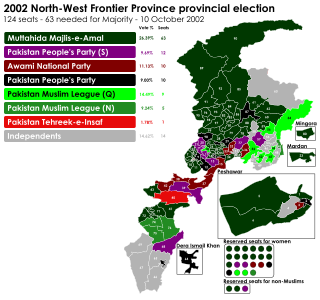
Provincial elections were held in the Pakistani province of North-West Frontier Province to elect the members of the 8th Provincial Assembly of North-West Frontier Province on 10 October 2002, alongside nationwide general elections and three other provincial elections in Sindh, Balochistan and Punjab. The remaining two territories of Pakistan, AJK and Gilgit-Baltistan, were ineligible to vote due to their disputed status. The elections were held under the military government of General Pervez Musharraf.
Elections in Khyber Pakhtunkhwa, a province of Pakistan are conducted in accordance with the Constitution of Pakistan. The Assembly of Khyber Pakhtunkhwa creates laws regarding the conduct of local body elections unilaterally while any changes by the Provincial Assembly to the conduct of Provincial elections need to be approved by the Parliament of Pakistan. Election Commission of Pakistan is responsible of conducting Elections in Khyber Pakhtunkhwa.



















